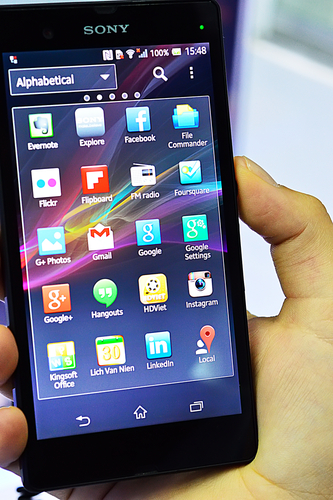December 2nd, 2013

Cyber Monday marks the beginning of a busy online shopping season. Unfortunately, that’s well known information, which means criminals will be targeting shoppers hoping to cash in on the holiday season. To keep yourself, and your bank account, safe, Jennifer LeClaire of Lumension suggests doing your online shopping and banking on a mobile device.
Many users assume that a mobile device, like a tablet or smartphone, is less secure than their PC. This is usually only true because they’ve failed to take the same security precautions on their mobile device that they have on their laptop or desktop. With security apps in place, mobile devices can be much more secure because there are far fewer threats specifically targeting them.
There are certainly pieces of malware made specifically for Android, and to a lesser extent Apple’s iOS, but it pales in comparison to the threats being produced for PCs. Both Apple and Android provide security in their app store. As long as users don’t venture outside of the store to download unverified apps, they should have an entirely safe environment. PC users typically download more and take more risks online, which leaves their PC teeming with vulnerabilities and possible infections.
If your mobile device has an antivirus app installed, and is absent of any existing malware, you’ll have a great foundation for a secure online shopping season. You’ll still want to use smart surfing tactics, however. For example, don’t use public WiFi for any activity where you’re asked to log-in to an account, or provide payment information. Public WiFi provides no security for your data, which allows criminals to easily intercept any information you send over that network. So, while a mobile device may be more secure for online shopping than your PC, it shouldn’t be used just anywhere. Shop from home on your own, secured network.
Regardless of how you plan to do your online shopping this year, you need to take the proper precautions. To secure any of your devices, remove viruses and malware, or to create a more secure network at home or the office, call Geek Rescue at 918-369-4335.
November 27th, 2013

There are a number of reasons to focus more on security for your mobile device, or the mobile device of your employees. For personal use, 7-percent of smartphone owners have been the victim of identity fraud, which is a substantially higher rate than the rest of the population. For businesses, about two-thirds use the bring your own device model, but only about 4-percent manage the company data their employees access with personal devices. In both of these examples, the issues stem from a lack of mobile security. Eyal Manor, of Information Week, writes that companies must focus on the data being accessed by employees, rather than the devices themselves, to improve security.
Many smartphone users don’t keep their apps and operating system updated, which opens security holes. Many don’t use a passcode either. There’s more and more mobile specific malware being introduced every day. These would be reasons to institute mobile device management, but when employees are using their personal devices, it’s difficult for more businesses to demand that type of access and control. Instead, here are three ways to improve security by focusing on the data being accessed, rather the individual device.
This tactic takes all of business-centric data stored on an employees device and locks it down in a special, encrypted area. Rather than putting controls on the entire device, companies are able to control only the encrypted area allowing them to ensure the safety of company data.
Users may not have strict security in place to restrict who can access their device, but for company information enhanced authorization can be installed so that data isn’t compromised in the case of theft or a lost device. Similar to containerization, only vital company data would be stored behind additional walls, which would require an employees log-in information to get through.
Regardless of the other safety measures taken to protect data, if it’s not encrypted, it isn’t safe. Hackers are continually evolving their tactics to get past enhanced security, so data theft remains a possibility. If your data is encrypted, however, you take added precautions that stolen data can’t be accessed by a third party, and won’t come back to damage your company. Remember that encryption is important both for stored data, and for data being sent between two parties.
For help improving the security of your company’s data, call Geek Rescue at 918-369-4335.
November 25th, 2013

The Nexus 5, Google’s latest Android smartphone that many consider a major competitor to the iPhone, was released only a few days ago. Those early adopters that jumped on the phone are already reporting a major issue, however. As Kurt Marko writes for Information Week, the Nexus 5 doesn’t work with most wired headsets. Users say that they can’t be heard by those they call when using a wired headset, but there are some solutions.
The problem only affects those using wired headsets, which means the Nexus 5 works fine with bluetooth or when making a phone call and speaking directly into the phone. Some have reported that the Nexus 4 had the same problem, but the Nexus 10 tablet appears to have no issue.
Some testing suggests that this is a software problem. By using an app that allows recalibrating of the microphones, it was discovered that a wired headset works great for recording. However, there’s no way to recalibrate the microphone for making phone calls with the headset.
Others, however, have suggested that the problem lies in the way the wired headsets are designed. Most are built for iPhone users, but Apple uses different specifications than other manufacturers. What that means for Nexus 5 users is that a work-around is necessary if you want to be heard while making phone calls with a headset. With a headset is plugged into the Nexus 5, hold down the ‘pause/resume’ button. This will connect you to the proper input and allow your voice to be heard. It eliminates the ability to end calls or pause music, however.
Google has already publicly stated that they’re aware of the problem and are working on a fix. Until that fix comes, users are stuck being forced to hack their headset, or to go without one.
Regardless of what smartphone you use, Geek Rescue fixes whatever problems you encounter. Bring your phone in to one of our locations or call us at 918-369-4335.
November 22nd, 2013

Malware for both PCs and smartphones continues to be a growing problem worldwide. Adam Greenberg, of SC Magazine, reports that much of the new malware discovered in the past quarter uses techniques to falsely verify, or by-pass altogether, digital signatures used to validate legitimate applications and files.
Researchers with security company McAfee reported a 30-percent increase in malware for Android,m which equates to about 700-thousand new pieces of malware. Most of this mobile malware is known as “Exploit/MasterKey.A”, which allows for the avoidance of digital signature validation.
This method is also being used in the increasing threat of malware for PCs. Malware for PC users using falsified digital signatures is up 50-percent this quarter with more than 1.5-million new pieces identified.
These latest tactics are more intelligent ways of making users believe a file of application they’ve downloaded is safe for use. Antivirus software company, BitDefender, reported one malware scam that convinces users that they’re downloading an antivirus program called ‘Antivirus Security Pro’. It contains a stolen digital signature and when run, it identifies false examples of malware and demands money to fix the problem.
Examples like this are why it’s important for users to keep security software up to date. Antivirus applications struggle to keep up with the latest tricks of cyber criminals, and it’s impossible for them to catch the latest pieces of malware that attempt to infect your system if they’re out of date.
If your computer or smartphone falls victim to malware, or you’d like to improve your security before the next attack happens, call Geek Rescue at 918-369-4335.
November 20th, 2013

Stolen smartphones are a big problem in the US. About one in three robberies involves a smartphone and lost or stolen phones total about $30-billion each year, according to the FTC. A possible solution, or at least a tool that could decrease the number of smartphone thefts, has been found, but as Daniel Johnson, of The Telegraph, reports, US carriers have refused to use it.
It’s called ‘Kill Switch’ and it allows phones to be disabled remotely in the event they’re stolen. The thinking is that criminals would be less likely to steal phones if they were immediately disabled and made worthless except for spare parts. Samsung liked the idea so much they began making smartphones with Kill Switch pre-installed. Those phones won’t be available in the US, however.
AT&T, Verizon, T-Mobile and US Cellular have rejected Kill Switch and forced Samsung to remove it from all phones set for distribution in the US. Their official stance is that Kill Switch could be used by hackers to disable phones that haven’t been stolen.
According to some industry insiders, however, the rejection of Kill Switch has more to do with the potential loss of insurance revenue. It’s believed that theft insurance would be less in demand if Kill Switch became standard on all devices. This thinking ignores the fact that insurance would still be useful for lost and broken phones, however.
The problem remains implementing a kill switch in a more secure manner. The possibility of hackers remotely disabling smartphones poses a serious problem, which won’t be easily solved given that Kill Switch is software and software is inherently hackable.
At Geek Rescue, we can’t stop your smartphone from being stolen. But, we can fix nearly any other problem you’re having with your device. For broken or unresponsive screens, slow performance, malware, or any other issue, call us at 918-369-4335 or bring your phone in to one of our locations.
November 12th, 2013

You may have heard the latest smartphone rumors of a curved screen. Samsung will have the first curved glass offering, the Galaxy Round announced a month ago. Jason D. O’Grady, of ZDNet, reports that the curved screen isn’t just a gimmick. It also offers an enhanced user experience.
First, the curve isn’t dramatic. The Galaxy Round features a screen only .10 inches away from flat, which is about equal to the curve of most handheld mirrors. This slight curve greatly reduces the negative effects of ambient light on the screen, however. This makes it easier to read, makes colors more true, improves contrast and more. The curved screen is also much easier to use outside in sunlight.
A screen that’s naturally easier to read has some additional benefits, as well. Most notably, battery life could be much better because screen brightness can be turned down without losing readability.
The iPhone 5S, Apple’s latest smartphone release, has been knocked repeatedly for poor battery life. There are already many rumors suggesting that a future iPhone will go the curved screen route.
Part of that speculation comes from Apple’s recent purchase of synthetic, manufactured sapphire and its construction of a plant in Arizona. Sapphire crystal is already used on the Touch-ID home button on the iPhone 5S. It’s regarded as tougher and more scratch resistant than Gorilla Glass, which is currently being used to make iPhone screens.
No matter what shape your smartphone’s screen is, Geek Rescue fixes it when it breaks. Call us at 918-369-4335 or come by one of our locations to get your devices working like new again.
November 6th, 2013

If you have an Android smartphone, you’ve probably noticed that there are a number of apps that came pre-loaded on it that you don’t need and don’t use. These apps come from the phone’s manufacturer, but as Liam Tung of ZDNet writes, they may be creating vulnerabilities in your smartphone’s security.
Researchers at North Carolina State University examined pre-installed apps on smartphones made by Google, Samsung, HTC, LG and Sony. Of the 10 devices studied, 86-percent of pre-loaded apps requested more permissions than they actually used. This gives the apps access to data they don’t need, but that data becomes accessible when the app is compromised.
In terms of sheer number of vulnerable, pre-installed apps, the HTC Wildfire S and the Samsung Galaxy S2 had the most of the pre-2012 devices. For post 2012, the Samsung Galaxy S3 contained a stunning 40 vulnerabilities. In contrast, Google’s Nexus 4 only had three vulnerabilities.
Google itself has a good track record for releasing security patches to fix vulnerabilities found on their hardware. However, for individual manufacturers like Samsung, Sony and HTC, these patches take time to roll out to customers. For the devices studied, an average of 6-months is how long it took for an officially released security patch to finally make it to all affected customers. That amount of time leaves a large window for hackers to exploit those vulnerabilities.
Some of these native apps are able to be removed by users, but many others cannot be. This means users stay at risk until an appropriate security patch is released to fix the problem. So, next time you’re in the market for a new Android smartphone, be sure to consider how many pre-installed apps it comes with.
At Geek Rescue, we remove malware, fix broken hardware and improve security on all kinds of devices, including smartphones. Whatever your issue, call us at 918-369-4335 or stop by one of our locations.
October 31st, 2013

There have been relatively few true threats to the security of iPhones compared to the amount of malware being produced for Android. A serious threat has recently emerged, however. Antone Gonsalves, of Network World, reports that a team of security experts uncovered a vulnerability in a large number of iOS apps. The flaw allows for a third party to intercept data and then send their own directly onto a user’s device.
The team is calling it “HTTP Request Hacking” because it allows hackers to intercept HTTP traffic between the app and server. The hacker can then tell the app to retrieve data from a different server, which usually involves putting malicious links on your iPhone and iPad. This method is particularly effective for news apps because the hackers can put fake links in the news stories, which cause malware to be downloaded when clicked.
Once a hacker gains control of the app, they can continue to send whatever data they want until the app is updated to close the security gap, or removed completely.
There is such a large number of affected apps that the security team couldn’t contact all of them directly. Instead, they opted to spread the word through the media. The vulnerability only affects apps using an HTTP connection. Most high quality apps use the more secure HTTPS connection.
There’s code available to fix the problem, but it’s much easier to just remove the app. If it’s using an HTTP connection, you probably shouldn’t be using it anyway.
This particular security flaw was specifically found for iOS and while it hasn’t been tested on Android, security experts note that it’s likely that would affect those users as well.
If you believe you have malware infecting any of your devices, come by or contact Geek Rescue at 918-369-4335. We will fix your phone, tablet or computer and help make sure you’re prepared for the next malware attack.
October 30th, 2013

The release of any new Apple product always dominates headlines, but it’s Samsung who’s captured the interest of the tech-savvy crowd most recently. Though it’s not due out for at least another 3 months, the Samsung Galaxy S5 is already being hailed as the next big thing in smartphones. Simon Hill, of Digital Trends, covered all of the rumors about the Galaxy S5 in his recent blog post.
The Galaxy line of smartphones have traditionally been made of plastic, which some users complain makes them feel cheap. Rumors suggest Samsung may have listened to those critics and could be releasing the S5 with a magnesium, aluminum or carbon fiber design. However, others have suggested that the Galaxy F will get the metal case, while the S5 will a “faux leather polycarbonate” similar to the Samsung Note 3.
Samsung’s mobile head has promised “64-bit processing functionality”, which means it will at least match the iPhone 5S. Many experts have suggested that the Galaxy S5 will also include “at least 3GB of RAM”. Samsumg is actually already producing 4GB LPDDR3 mobile DRAM so that’s seen as a possibility also.
The iPhone 5S made a splash with its new fingerprint scanner included to enhance security. The Galaxy S5 could be making a similar splash by introducing an eye scanning sensor. This is probably the most unsubstantiated rumor about the S5, but given Apple’s foray into biometrics, Samsung will likely try to keep up or surpass them. Officials from Samsung have already denied that they’re working on a fingerprint scanner, but an eye scanner remains in play.
Initially, rumors suggested the Galaxy S5 would get a 13-megapixel camera, which would match the camera included in the S4. Now, it seems Samsung could upgrade the camera to a 16-megapixel sensor, which they will produce themselves. The camera would also include technology that would greatly improve low-light performance.
In June, Samsung released a variant of it’s latest flagship smartphone called the Galaxy S4 Active. The Active version promised to be both waterproof and dustproof. It stands to reason then that the Galaxy S5 will be both waterproof and dustproof right out of the box.
Most estimate the Galaxy S5 will be released in the spring with March or April matching Samsung’s usual release cycle. That leaves months of speculation left.
Whether you jump on the latest and greatest smartphone, or stick with a trusted older version, Geek Rescue in Tulsa handles repairs. Bring your devices by for fast and friendly service, or call us at 918-369-4335.
October 25th, 2013
 via Experian
via Experian
Identity theft is a real and costly threat. Even though it’s well publicized, many Americans fail to take the necessary precautions to prevent it and some even take actions that make it easier for criminals to steal valuable information.
As the included infographic notes, most Americans believe they’re doing enough to protect themselves online, but most also feel that they are at a significant risk of having their identity stolen. This may stem from a prevailing belief that there is no way to be completely secure. While that is true to an extent, there are certainly some steps every individual can, and should, take to protect their information.
- Create stronger passwords using upper and lowercase letters, symbols and numbers. Then, use a different password for each online account.
- Don’t post personal identifiable information like your birthdate, employer and education on social media. If you do, make sure you’re able to hide it from most users behind privacy settings.
- Add security to mobile devices. Require passcodes to use smartphones and tablets and install security apps.
- Before making any transaction online, check to see if the website is trusted and secure. Most trusted sites will use ‘https’ for secure communication.
The key to keeping your digital information safe is to protect it as much as you can. While it’s true you can’t be completely immune from cyber attacks or identity theft, by taking necessary precautions you significantly decrease the risk.
For additional help staying safe online, or to improve the security on your devices, call Geek Rescue at 918-369-4335.




















